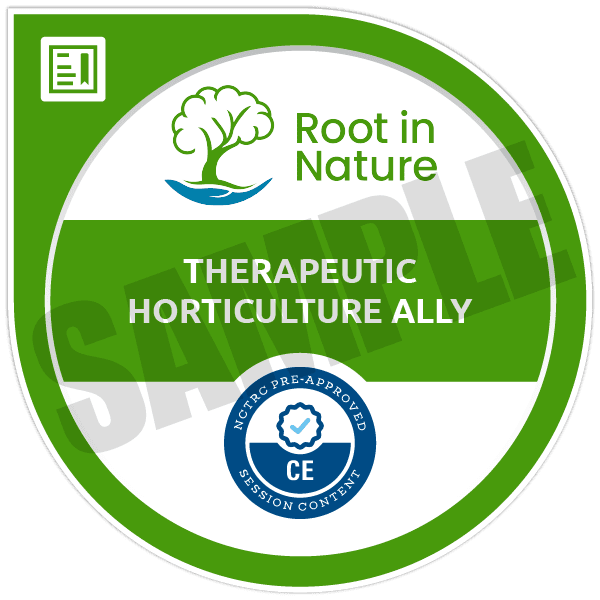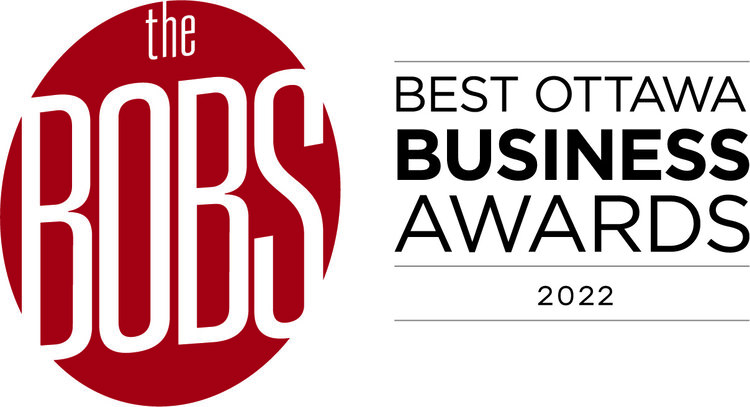Introduction to Therapeutic Horticulture Course
Course Summary
Introduction to Therapeutic Horticulture is a self-paced online course for professionals and aspiring practitioners who want to bring the benefits of nature into health, education, or community work.
Whether you’re a recreational therapist, activity director, educator, mental health professional, or simply curious about the healing power of plants, this course provides a clear and supportive starting point. You’ll learn what therapeutic horticulture is, why it works, and how it’s applied across diverse settings, with no prior experience or green thumb required.

Emilee Weaver, Director of Learning & Community Engagement
Watch a Course Preview
Get a glimpse inside the course with this 13-minute preview video. It brings together a series of clips from the lessons, giving you a feel for the learning style, topics covered, and the supportive approach that guides you through the foundations of therapeutic horticulture.
Course Description
Introduction to Therapeutic Horticulture is a foundational, self-paced online course designed for professionals and aspiring practitioners who want to enter the field of therapeutic horticulture or integrate nature-based approaches into their existing practice.
Through engaging, easy-to-follow lessons taught by Emilee Weaver and Katie McGillivray, HTR, you’ll explore the theoretical and evidence-based foundations of therapeutic horticulture, ethical guidelines, and professional values that shape safe and inclusive practice. You’ll also be introduced to client populations and program settings, facilitation strategies, and foundational horticultural knowledge, including how to adapt tools and techniques for diverse physical, emotional, and cognitive needs.
Rooted in research and real-life application, this course is your first step toward creating meaningful, nature-connected experiences that support growth, healing, and joy. It also serves as the prerequisite for Root in Nature’s advanced therapeutic horticulture training, helping you build a working understanding of the field and clarify your role, interests, and next steps.
By the end, you’ll know not only what therapeutic horticulture is, but also how to move forward with purpose.
What's Included
Registration fee includes:
- Seven video-based lessons (69 topics) with resources
- Guest speaker videos
- Program and participant case studies
- Five quizzes
- Lifetime access to the course
- Certificate of completion
- Digital badge
- Eligibility for CE credits (NCTRC, APNCC, TRO, and CHTA points)
- Bonus: Six month free membership to GrowTH Network, our international community of therapeutic horticulture practitioners, which includes:
- A Resource Library filled with ready-to-use tools and templates
- A TH Activity Database that is sortable in multiple ways
- Expert-led monthly practitioner support calls
- Professional development events
- This offer is available to non-members only. Current GrowTH Network Members receive a 20% course discount with their membership.
Course Fee & Manual
Course Fee: $325 USD
Course Manual (optional): $25 USD
The 120 page course manual is a comprehensive PDF that captures all the main points from the course in one place. It’s designed to:
- Consolidate the key concepts so you can focus on learning instead of taking extensive notes
- Serve as a lasting reference, like a textbook you can return to anytime
- Support open-book quiz completion
- Provide a quick refresher on foundational knowledge as you move into more advanced or practice-based training
- Provide a glossary of 130+ TH Terms
While not required, many students find the manual to be a helpful resource they continue using well beyond the course.
Time Commitment
The course takes approximately 10–12 hours to complete. This includes eight hours of video lessons and an additional 2–4 hours for quizzes and engaging with the resource materials.
While you’re free to set your own schedule (there’s no deadline or expiration), we recommend completing the course within 4–6 weeks to stay engaged and build momentum in your learning.
You will not be required to attend any live calls during this course – all content is pre-recorded and self-paced.
Continuing Education Credits
- Pre-approved by the National Council for Therapeutic Recreation Certification – NCTRC for 12 hours
- Pre-approved by the Activity Professionals National Credentialing Center – APNCC for 12 hours
- Approved by Therapeutic Recreation Ontario – TRO for 8 hours of PCCs (application for 12)
- Approved by the Canadian Horticultural Therapy Association – CHTA for 0.3 points per 40 contact hours of instruction
- Accepted by Master Gardener programs – meets the criteria for continuing education in many U.S. and Canadian programs
How it Works
After you purchase, simply sign in to your account at the top right corner of the website and you’ll find the course and manual (if purchased) under Courses → My Courses.
You’ll have lifetime access, so you can move through the lessons at your own pace and revisit them anytime.

What you'll gain:

- A clear understanding of what therapeutic horticulture is, why it works, and how it’s applied across diverse settings
- Knowledge of the evidence-based foundations that support therapeutic horticulture outcomes
- An overview of client populations, program settings, and examples of real-world applications
- Insight into basic horticultural concepts and how they connect to human health and well-being
- Recognition through a digital badge and eligibility for CE credits (NCTRC®, APNCC, TRO, CHTA)
- A six-month free membership in the GrowTH Network, connecting you with practitioner resources, support calls, and an international community
Meet Your Instructors

Emilee Weaver

Katie McGillivray, HTR
We love hearing from you!
Course Structure

Course Introduction
Get oriented to the course, meet your instructors, and learn more about how the course manual can assist your learning journey.

Historical and Theoretical Foundations of TH
Explore the roots of therapeutic horticulture: what it is, where it originated, and the research and theories that inform and support its effectiveness. Learn how universal design principles and therapeutic gardens shape practice, consider ethical dimensions, and explore real-world examples of programs in action.

Fundamentals of TH
Discover the populations, activity types, and settings where therapeutic horticulture is practiced. Examine the core domains of wellness it supports, compare program models, consider the roles of facilitators, and hear stories from participants themselves.

TH Program Development
Build an understanding of how programs are designed and sustained, from community engagement and goal-setting to documentation, scheduling, income and employment models. Includes practical case studies.

TH Activity Facilitation
Learn best practices for planning and leading sessions, safety considerations, and using nature metaphors. Uncover the power of adaptive tools, techniques and developing intentional goal-driven therapeutic environments.

Horticulture Foundations & Concepts
Gain foundational plant knowledge, from soil and seeds to plant care, safety, and plant toxicity. Learn how sensory and culturally significant plants can be incorporated into practice, and how adaptive approaches make horticulture accessible for all.
Benefits of Therapeutic Horticulture

Enhancing the Environment
Plants and nature create a calming and relaxing environment that can promote wellness and enhance the overall atmosphere of a therapeutic session.

Reducing Stress
Exposure to plants and nature has been shown to reduce stress and anxiety levels, which is beneficial for individuals who are experiencing mental health conditions or chronic illnesses.

Improving Physical Health
Spending time in nature and around plants can promote physical activity and exercise. Therapeutic horticulture activities can be incorporated into therapeutic sessions to promote physical health.

Boosting Mood
Being in nature and around plants can boost mood and help individuals feel more positive and optimistic. This can be especially helpful for individuals who are experiencing depression or other mood disorders.

Promoting Social Connections
Group therapeutic horticulture sessions can provide opportunities for social interaction and connection, as well as promote bonding and create a sense of community.

Improved Client Outcomes
Therapeutic horticulture has been shown to improve a range of outcomes for clients, including mental health, physical health, and overall quality of life. Practitioners can learn how to effectively use horticulture to improve their clients’ outcomes.
Benefits for Course Students

Specialized Knowledge
The Intro to Therapeutic Horticulture course provides specialized knowledge and skills related to using plants, gardening, and nature as therapeutic tools, which helps practitioners incorporate this into therapy sessions.

Professional Development
Training in therapeutic horticulture can be a valuable form of professional development for practitioners which enhances their skills and knowledge, making them more effective in their role.

Expanded Therapeutic Options
Through this course, practitioners can expand the range of therapeutic tools they can offer their clients and can provide clients with unique and effective therapeutic experiences.

Digital Badge & Certificate
You will receive a digital badge as well as a certificate as a Therapeutic Horticulture Ally upon course completion.
FAQs
Are more courses offered on this topic if I want to continue my learning?
Yes. After this course, you can continue in two main ways:
1. Certificate pathway (advanced training series)
This Introduction course is the entry point and prerequisite for our advanced courses in the Therapeutic Horticulture certificate pathway. By completing those courses, you can earn the TH Facilitation Certificate, the TH Program Development and Management Certificate, or both. If you complete both certificates, you’ll earn the full Therapeutic Horticulture Certificate which recognizes comprehensive training in foundational knowledge, facilitation skills, and program development.
2. Standalone professional development + mini-courses
We’re also building a wider library of thematic learning opportunities (e.g., Supporting Emotional Resilience and Action in a Changing Climate) and a growing suite of shorter courses on specific skills and practice themes.
For current offerings, waitlists, and launch dates, please view our Courses Overview page, the Root Beat newsletter, and social channels.
Will I be qualified to practice therapeutic horticulture after taking this course?
This course provides foundational knowledge, but it is not designed to prepare you to independently develop or facilitate therapeutic horticulture programs or activities.
Upon completion, you may describe yourself as a Therapeutic Horticulture Ally, with an understanding of:
- the populations TH practitioners serve
- the settings in which programs are delivered
- how TH supports a range of outcomes across diverse environments
If your goal is to practice therapeutic horticulture (facilitate and/or develop programs), we recommend continuing into the advanced pathway courses (Facilitation; Program Development & Management).
Does this course certify me to become a horticultural therapist?
No. This course does not certify you as a Horticultural Therapist (HT).
This course provides training in therapeutic horticulture foundations. Even the full Therapeutic Horticulture Certificate pathway is designed to prepare learners to practice therapeutic horticulture—not horticultural therapy.
Horticultural therapy is a distinct clinical profession with its own training pathways and requirements; this course focuses on therapeutic horticulture as an evidence-informed practice approach.
Is there group pricing?
Yes—please visit our For Organizations or For Educators pages for corporate group rates, or contact us at courses@rootinnature.ca.

Best Ottawa Business (BOBS) Award Winner
Root in Nature was recognized for Best Performance in Social Entrepreneurship by the Ottawa Board of Trade and the Ottawa Business Journal.

Coralus Venture
Root in Nature is grateful to be selected as one of the Ventures working on the World’s To-Do List by Coralus Activators. We receive interest-free funding, connections and relationships to grow our impact.

